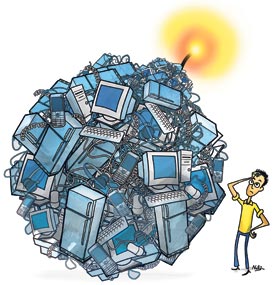A new United Nations report indicates that discarded
electronic devices such as computers and cell phones are a major threat to the
environment and public health.
The report, compiled by the United Nations Program for
Environment (UNEP) calls for new regulations are formulated to ensure that
electronic waste is recycled in a conscious way.
The rise of the electronics industry has had negative
implications, especially in developing countries, where efforts to recycle cell
phones, computers and televisions do not conform to the large sales volumes.
The UN environmental agency estimates that electronic waste, or e-waste is
growing at a rate of 40 million tons a year.
Excess electronic waste
In countries such as India and China it is estimated that
only waste generated by discarded computers will increase 500% over the next
decade. Electronic devices contain metals and some potentially toxic elements,
so recycling is complicated.
But in many countries, including China, these wastes are
incinerated in landfills, emitting poisonous gases into the atmosphere. Mexico
and Brazil are also among the countries facing growing mountains of electronic
scrap.
UN warns that without immediate measures to ensure the
collection and safe disposal of this waste, many countries will be flooded in
electronic waste that will have serious consequences for the health of the
public.
The report calls for establishing regulated formal processes
for handling and recycling of e-waste. UNEP recognizes that this program would
be expensive to enter but, ultimately, create jobs, recover precious metals
such as gold and silver contained in electronics and contribute to a clean and
healthy environment.
